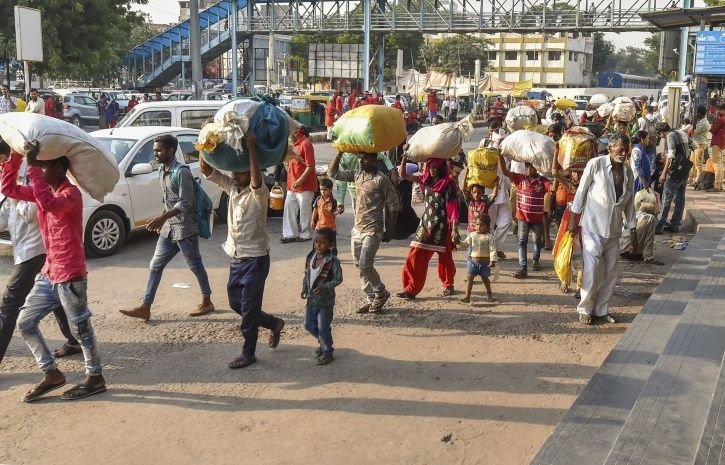Nearly 70 lakh Bihari migrants face a dilemma: stay for three weeks after Chhath to vote or return to work and skip the polls altogether. With migrants forming 7–10% of Bihar’s population, their absence could reshape the state’s electoral arithmetic and favour resident voters.
BY PC Bureau
October 6, 2025: The Election Commission of India’s announcement of the Bihar Assembly election dates—scheduled in two phases on November 6 and 11—has generated as much anxiety as anticipation. While the timing avoids clashing with the festive season of Diwali (October 21) and Chhath (October 28), it has created an unintended problem: the potential disenfranchisement of Bihar’s vast migrant workforce.
For millions of Biharis, especially those employed in Delhi, Mumbai, Surat, Bengaluru and other industrial hubs, Diwali and Chhath are the only occasions when they return home. Chhath, in particular, carries deep cultural and religious significance. But with polling dates set nearly two weeks after the festival, migrants face a near-impossible choice: either stay back in Bihar for three weeks to cast their votes, or return to their places of work and attempt another costly, logistically difficult journey. For workers in the unorganised sector—construction labourers, factory hands, domestic workers—long absences are rarely tolerated by employers, and daily wages lost cannot be easily recovered.
Election Commission releases Bihar election schedule Elections to be held in two phases on November 6 and 11 Counting on November 14, results to be announced #BiharElections #ElectionCommission pic.twitter.com/jmekiVHXl6
— Gummalla Lakshmana (@GUMMALLALAKSHM3) October 6, 2025
This practical dilemma affects not just a few individuals but an enormous voter base. Estimates suggest that 7–10 percent of Bihar’s population resides outside the state, amounting to nearly 70 lakh voters. Their participation, or lack of it, could decisively alter electoral outcomes. Migrants often bring back expectations shaped by their exposure to urban governance, their frustrations with Bihar’s limited job opportunities, and their aspirations for a different political discourse. Their voices, however, risk being muted if they cannot remain in Bihar until polling day.
READ: SC Issues Notice to Centre on Wangchuk’s NSA Detention
The implications are profound. A reduced migrant turnout would tilt the balance toward resident voters—farmers, women, older citizens—whose priorities often revolve around welfare schemes, food security, pensions and local patronage. Political parties that have invested in welfare distribution may find themselves at an advantage, while those banking on young and urbanised voters seeking employment and governance reforms may struggle. This could narrow the election debate to short-term relief rather than long-term transformation.
The problem is not unique to Bihar. States like Uttar Pradesh, Kerala and Punjab, all with large migrant populations, have faced similar issues. Despite discussions about postal ballots, remote voting machines and out-of-state polling booths, migrant voting rights remain unresolved. As a result, the very group that sustains Bihar’s economy with remittances—contributing billions annually—remains marginalised in its politics.
READ: Opinion: Unmask the Face That Hired the Assam Rifles Killers
The million-dollar question, then, is whether Bihar’s migrants will manage to cast their votes this time. For many, the answer seems bleak. To stay back for weeks is to risk their livelihoods; to return twice is financially draining. The outcome of the Bihar elections may thus reflect not the collective will of the state’s people, but only of those able to remain within its borders. In a democracy that prides itself on inclusivity, the exclusion of nearly 70 lakh voters by circumstance, if not by law, is a sobering reality.














